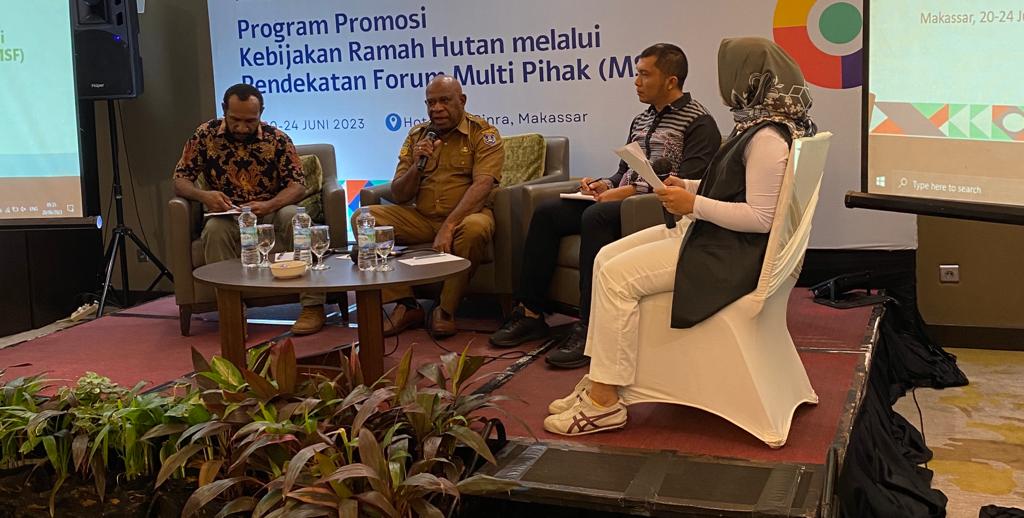
A multi-party forum or Multi Stakeholder Forum (MSF) is a collaboration across sectors or stakeholders such as local government, civil society groups, academics, the private sector and the community based on government administrative areas. This forum has a common goal to achieve the desired changes in regional development. Each party brings different perspectives and expertise, thereby creating strong synergy to achieve common goals.
One of the MSFs that has been formed and has had an impact on regional development is the MSF of Sarmi Regency, Papua. The forum, which was initiated in 2013 and started to be active again in 2021, started with the spirit of the Sayang Sarmi Movement (GSS), which has members from the government, civil society groups and society in general—especially young people. MSF in Sarmi Regency is a bridge for the community in providing suggestions to the regional government regarding program planning for the region.
MSF Sarmi Regency is running effectively because it has good support from the regional government. Agus Festus Moar, Acting Regional Secretary of Sarmi Regency, said that Sarmi Regency was able to recover because the government began to open itself to collaborating with civil society groups. “If our government does not open up, these friends will definitely experience difficulties in developing their regions,” said Agus.
This was also confirmed by Irianto Jacobus, Director of KIPRa Papua. He said that KIPRa felt well received while participating in MSF in Sarmi Regency. The enthusiasm for change among MSF members, whether they come from local government or civil society, is to preserve the environment. “Bappeda in Sarmi Regency supports this forum and is a driving force in MSF,” said Irianto.
Meanwhile, other regional governments, such as the Jayapura and Merauke Regency Governments, also expressed support for collaborative efforts through MSF and agreed that MSF would be replicated in their regions. Lukman Enrico Rayhatson, Secretary of BAPPEDA Jayapura, said that his party would welcome MSF’s presence in Jayapura, especially if the issues to be raised were related to the economic components of society. “Jayapura Regency has good natural resources, but the community has not been able to manage them optimally, they are still seasonal,” said Lukman.
The existence of a multi-stakeholder forum in Jayapura Regency can be seen from the presence of the Indigenous Community Task Force (GTMA). In GTMA, civil society groups work together with local governments to map customary territories and create planning, empowerment, processing registration of customary territories, and resolving conflicts in customary territories.
Customary forest management in customary areas requires a budget planning system that is measurable and considers ecological aspects. Naomi Marasian, Director of Pt. PPMA, said that for the last three years civil society groups in Papua have also been pushing for Ecology-based Regency Budget Transfers (TAKE). This effort is part of supporting the sustainability of customary forest management in Papua. “Therefore, it requires time and resources as well as further collaboration in the process,” said Naomi.
Apart from Jayapura Regency, the Regional Government of Merauke Regency also welcomes collaborative initiatives for regional development. Leon Adrian Gebze, Secretary of the Merauke R&D Bappeda, recommended creating joint targets between the government, civil society groups and other general public who wish to be involved in multi-stakeholder forums. The hope is that this joint target can be expressed in a memorandum of understanding (MoU) so that it can become a strong commitment and evaluation instrument during the implementation of the program.
Paschalina, Director of the Wasur Lestari Papua Foundation (YWLP), said that her party was very happy to know that the Regional Government of Merauke Regency welcomed the multi-party forum initiative. According to him, in Merauke Regency previously there were civil society groups who were actively involved in discussing development programs. However, civil society groups at that time were better known for their protest movement approach. The presence of MSF in Merauke Regency will be able to build positive synergy between local government and civil society groups in promoting a development agenda that is more pro-community.
Seeing the good response from local governments in Sarmi, Jayapura and Merauke Regencies as well as the spirit of collaboration in development of civil society groups in these areas, Bejo Untung, Executive Director of PATTIRO, said that PATTIRO will try to promote what has been done by regional colleagues through advocacy at the national level. “Perhaps there is an action plan that has been formulated at the central level which can be synergized at the district level,” said Bejo.




